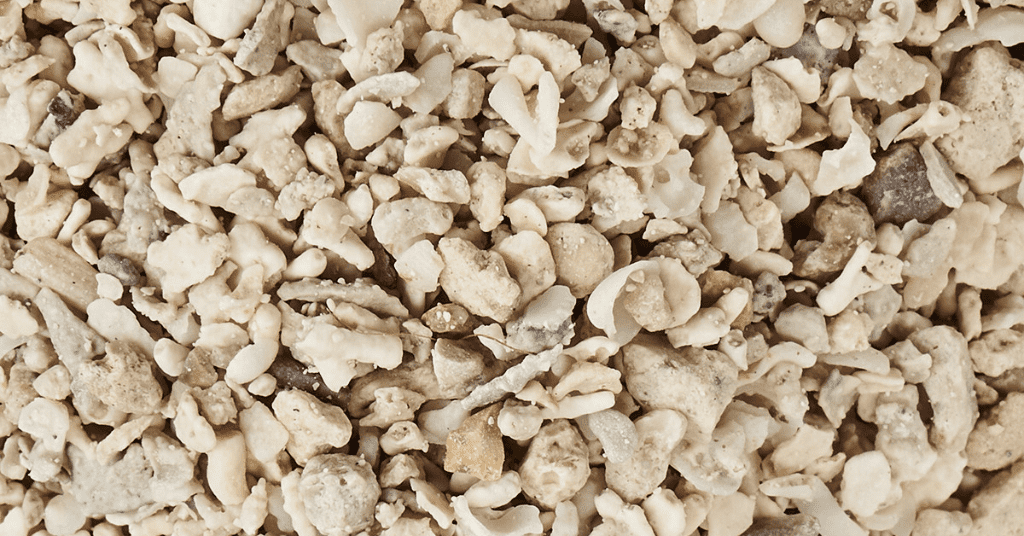Last Updated on July 16, 2022 by cmoarz
Many aquarium owners do not have access to suitable water straight from a tap for their aquarium.
Often, these waters are too soft or acidic for the animals they wish to keep. Fortunately, there are many products on the market that can be used to raise the hardness and alkalinity of water, making it more suitable for a wider variety of aquarium inhabitants.
Crushed coral is one such product and can be an excellent way to raise the pH of your aquarium water.

How does crushed coral work?
Table of Contents
As the name suggests, Crushed coral (mostly limestone, aragonite, and calcite) comes from ancient reefs that have long since died and been buried.
When added to aquarium water, these small pieces of coral will slowly dissolve, releasing calcium and other minerals into the water.
These minerals will help to raise the hardness and alkalinity of the water, as well as increase the pH.
The general rule of thumb is 1lbs of crushed coral to every 10 US gallons of water, although you may need to test based on your desired results and the makeup of your water to start with.
Crushed coral can be used in both fresh and saltwater aquariums, although it is more commonly used in saltwater tanks.
This is because many of the animals kept in saltwater aquariums require higher levels of calcium and other minerals than those in freshwater tanks.

Does crushed coral last forever?
No, Eventually the crushed coral will be used up and you’ll have to add more. Depending on how much needs to be added, it could last months or even years.
Over time, the crushed coral will slowly change the composition of your aquarium water for the better, making it more hospitable for a wider variety of aquatic life.

What’s the best way to use crushed coral?
Crushed coral can be used on its own as an aquarium substrate, but it’s better to be mixed into the existing substrate such as sand or stone or whatever you happen to be using.
This way, it will leach minerals and raise the pH of the water gradually over time, rather than all at once which could shock your fish.
To do this, simply mix the crushed coral into the top layer of your aquarium substrate.
If you have a saltwater aquarium, you can also add crushed coral to your refugium or sump to help raise the overall alkalinity and pH of your system.
People have been known to add it into their aquarium canister filters as well.

How long does crushed coral take to raise ph?
Once the coral has been added to the aquarium, you should start to notice the effect within a couple of days to a week.
The pH will continue to rise slowly over time as the coral continues to dissolve and release minerals into the water.
It’s important to keep an eye on the pH levels in your aquarium though, as adding too much-crushed coral at once can cause a sudden and drastic increase in pH.
This can be harmful to your fish and other aquatic animals, so it’s important to add the coral slowly and in small amounts until you reach the desired pH level.

Adding crushed coral to established tank
If you already have an established tank and you don’t wish to uproot all your plants in order to mix in the coral, don’t worry!
You can still add crushed coral to your aquarium and reap the benefits without having to disrupt everything.
Simply place the coral in a mesh bag or piece of pantyhose and hang it from the side of the tank where it will slowly leach minerals into the water and raise the pH over time.
You can also add it to your filter media and let the water run through it that way (assuming it doesn’t interfere with the filter doing it’s job).
You can also sprinkle a layer at the top, and mix it into the areas where plant roots are not too dense.
The important thing is to not add too much at once and to keep an eye on the pH levels in your aquarium so that you don’t cause any sudden spikes.
Slow and steady is the key!

When does crushed coral become ineffective?
Generally, once a ph above ~7 is reached, the Crushed coral dissolving rate will slow down and maintain the pH at that level.
If you have a lot of plants in your aquarium, they may also help to buffer the water and keep the pH stable even without the coral.
That being said, every aquarium is different so it’s always best to test the water regularly and make adjustments as needed.
About
Owner of AquariumGravel.com and also owner of actual Aquarium Gravel believe it or not! ;). Setting up beautiful aquarium sceneries and habitats since I was very young. Enjoy!
- Web |
- More Posts(290)

